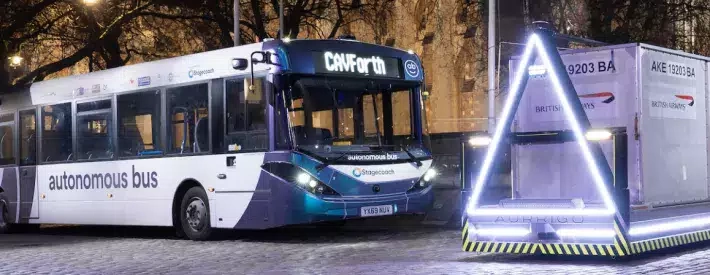AV myth-busting: from self-driving denial to terrorist hacks

In a world where misinformation can take root quickly and spread faster than fire, it’s important to separate fact from fiction. It’s something we’ve done with electric vehicles, and now we’re turning out attention to automated vehicles.
“It’s clear that many people are still not sure whether self-driving vehicles will be safer than human drivers, and don’t know whether they will improve travel or who will benefit most,” concluded the 2021 Myth-Busting Self-Driving Vehicles paper by the road safety charity, Brake.
Compared to bizarre but persistent urban legends like “dogs can’t look up”, these sound like reasonable doubts which can and should be addressed. That said, it is universally accepted that the automated vehicle (AV) industry has a public perception mountain to climb.
You can probably group concerns from people into three: the deniers, opponents, catastrophisers. So what are their concerns?
Self-driving deniers
The people who think it’ll never happen – those living, wilfully or not, in denial of the capabilities of modern transport technologies. Exhibit A: The headline “Self-driving cars are another Silicon Valley fantasy that will never work” in The Telegraph last September.
Being as balanced as we can, the industry has somewhat brought this upon itself by overpromising. In 2018, Elon Musk felt “very confident” that Tesla owners would be sending their cars out as robotaxis the following year. That didn’t happen.
Fast forward to 2024, however, and AVs are on the road. In America, Waymo says it has conducted “7+ million miles of rider-only driving”. In Scotland, Project CAVForth – using a specially modified fleet of Stagecoach buses – has been taking fares daily since May 2023, giving tens of thousands of UK passengers their first taste of self-driving public transport.
Self-driving opponents
There are some who feel self-driving vehicles shouldn’t happen – that is their prerogative, but it is often extended to an assertion that nobody loves AVs. Exhibit B: “Maybe People Don't Want Self-Driving Cars After All” from US news and opinions website Jalopnik last October.
Ok, why should they? Last summer, The Self-Driving All-Party Parliamentary Group published a well-informed policy paper to make the case, starting with some pretty eye-catching economic and safety benefits.
“The UK has a unique opportunity for leadership in an industry that could be worth £750 billion globally by 2035,” it said. “The Government’s analysis of the sector showed that it could potentially generate £42 billion and 38,000 jobs for the UK economy by 2035.”
On the safety impact, it listed the four leading causes of road accidents – driver error, reckless behaviour, disobeying traffic laws and driver impairment – saying: “Research from the insurance industry shows that self-driving vehicles could save the NHS £2.3 billion annually in medical and ambulance costs by eliminating the 85% of accidents where human error is a contributory factor.”
Another oft-quoted benefit is improved accessibility. While urging the industry to engage more with the community, Gordon McCullough, CEO of the Research Institute for Disabled Consumers (RiDC), said recently: “Self-driving can clearly be a transformative technology for a lot of disabled people.”
Self-driving catastrophisers
Some like to focus on the nightmare scenario. Exhibit C: The headline “Terrorists could hack into driverless cars to use as weapons” in The Mail last October.
Cybersecurity has been one of the hottest automotive topics for a decade now, with increasingly frequent and sophisticated attacks met by ever more advanced defences. It was highlighted at the SMMT’s Connected 2024 event that we don’t invest as heavily as the banking sector. Maybe we should.
Another go-to for catastrophisers is the trolley problem – the question of who to save in no-win crash situations. Exhibit D: Jeremy Clarkson’s “Driverless cars are pointless – and they have built-in instructions to kill you” headline in The Sun.
That isn’t how perception software works, and, as Elliot Hemes, of IPG Automotive UK, says: “99% of the time, great brakes will get you out of trolley problem scenarios.”
The automotive industry is passing through a period of incredible changes, that makes it even more important to make sure the right information is getting to people. Whether that’s about autonomous vehicles, EVs, or any of the other number of changes happening. If it doesn’t the brakes can be put on the sector maintaining its position as one of the most important industries to the economy.




